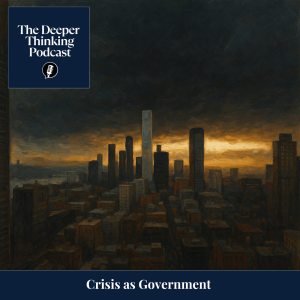
Thursday Feb 27, 2025
🎙️ Crisis as Governance: How Emergency Became the Default Condition – The Deeper Thinking Podcast
Crisis as Governance: How Emergency Became the Default Condition
For those seeking clarity in a world that never exits crisis.
We used to treat crisis as the exception. Today, it is the rule. This episode investigates how emergency governance became a permanent operating mode—reshaping democracy, law, and freedom. Governments no longer return to normal. They have learned to govern through disruption.
Drawing on Giorgio Agamben, Michel Foucault, Naomi Klein, and Edward Snowden, we trace the transformation of power across terrorism, pandemics, and economic collapse. What emerges is a deeply revealing pattern: emergency as the default strategy of control.
Reflections
- Surveillance systems built in crisis are rarely dismantled.
- Disaster capitalism thrives on instability—not order.
- Emergency governance masks as protection, but often centralizes power.
- The “state of exception” is no longer rare—it’s continuous.
Why Listen?
- Understand how crisis has become a political tool
- Learn how surveillance and law evolve under emergency conditions
- Explore the intersection of disaster, governance, and economics
- Hear from the most relevant philosophical and political frameworks of our era
Listen On:
Support This Work
If this helped reframe your thinking, consider supporting the podcast: Buy Me a Coffee.
Bibliography
- Klein, Naomi. The Shock Doctrine: The Rise of Disaster Capitalism. Picador, 2007.
- Agamben, Giorgio. State of Exception. University of Chicago Press, 2005.
- Foucault, Michel. Discipline and Punish: The Birth of the Prison. Vintage, 1975.
- Zuboff, Shoshana. The Age of Surveillance Capitalism. PublicAffairs, 2019.
- Snowden, Edward. Permanent Record. Metropolitan Books, 2019.
- Brown, Wendy. Undoing the Demos: Neoliberalism’s Stealth Revolution. Zone Books, 2015.
- Suleyman, Mustafa. The Coming Wave: AI, Power, and the Next Great Disruption. Crown, 2023.
If fear creates obedience, and instability becomes policy, what future does democracy have?
#CrisisGovernance #StateOfException #SurveillancePolitics #Foucault #Agamben #DisasterCapitalism #TheDeeperThinkingPodcast
No comments yet. Be the first to say something!